Eu venho pesquisando sobre filmes de guerra. Eu
descobri, com esta pesquisa, que filmes sobre a Segunda Guerra Mundial usam
comumente a narrativa do bem contra o mal. Comumente, mas nem sempre. Às vezes,
eu encontro um filme que trata a guerra sob uma óptica diferente – e isso
acontece aqui, no filme inglês “Longe dos Olhos”.
I've been researching war
films. I have discovered, with this research, that films about World War II are
usually use the good versus evil narrative. Usually, not always. Sometimes, I
find a film that talks about the war in a different light – it happens here,
with the English film “Perfect Strangers”.
Quarta-feira, 4 de abril de 1940. Um dia sombrio em
Londres. O dia em que a aventura do
casal Wilson começou, como diz o narrador – voz de Peter Lawford. Cathy Wilson
(Deborah Kerr) está resfriada. Seu marido, Robert (Robert Donat) precisa
enfrentar seu chefe e pedir o pagamento de oito semanas atrasadas antes de deixar
o emprego para se juntar à Marinha, o que Robert fará naquela noite.
Obviamente, Robert falha na missão, mesmo depois de ensaiar muito.
Wednesday, April 4th, 1940.
A gloomy day in London. The day when the Wilsons adventure started, as the
narrator says – it's Peter Lawford's voice. Cathy Wilson (Deborah Kerr) has a
cold. Her husband, Robert Wilson (Robert Donat) needs to confront his boss and
ask for the payment for eight weeks – value that his boss owes him – before
Robert leaves for the Navy that night. Of course, Robert fails his mission,
even after rehearsing a lot.
Enquanto Robert está na Marinha, Cathy se junta às
Wrens, uma parte da Mrinha exclusiva para mulheres. Lá ela conhece a espevitada
Dizzy Clayton (Glynis Johns). Logo, Cathhy está imitando o jeito de Dizzy,
imitando o jeito dela de usar batom, colocar acessórios e cortar o cabelo. Ela
não tem mais Robert para impedi-la de usar ou fazer algo de que ele não gosta.
E Robert, pouco a pouco, se esquece do rosto de sua esposa.
While Richard is at the
Navy, Cathy joins the Wrens, another branch of the Navy, but only for women.
There she meets the no-nonsense Dizzy Clayton (Glynis Johns). Soon, Cathy is
mimicking Dizzy's habits, like using lipstick, fashion choices and haircut. She
doesn't have Robert there to tell her what he doesn't like her to do or wear. And Robert, little by little, forgets his wife's
face.
Robert vai parar no hospital por causa de lesão por
congelamento nos dedos, e lá ele se interessa pela enfermeira viúva Elena (Ann
Todd). Cathy, por sua vez, sai com um engenheiro da Marinha, Richard (Roland
Culver), que está apaixonado por ela. Entretanto, nada realmente acontece com eles.
Robert goes to the hospital
because of several frostbite in his fingers, and there he gets interested by
the recently widowed nurse Elena (Ann Todd). Cathy, on the other hand, goes out
with a Navy engineer, Richard (Roland Culver), who is in love with her. But nothing materializes for any of them.
Finalmente é chegada a hora de o casal se
reencontrar! Robert e Cathy recebem folga ao mesmo tempo, depois de três anos
separados. Quando eles estão indo se encontrar, ambos de trem, vemos uma tomada
constante de trilhos de trem se aproximando e então se distanciando novamente.
É assim que o casal está agora: são meros desconhecidos indo se ver, mas
incapazes de terminar a relação porque um acredita que o outro não é capaz de
viver sozinho.
Finally it's time for the
couple to be reunited! Robert and Cathy get a leave at the same time, after
three years separated. As they go to see each other, both by train, we have a
constant shot of two tracks getting near each other, and then distancing each
other again. It's how they are now: different people, perfect strangers going
to meet each other, but unable to end the marriage because they both believe
the other can't live alone without a partner.
Quando eles se reencontram, a rua está tão escura
que eles não podem se ver e não podem ver como estão diferentes – Robert tirou
o bigode, e Cathy cortou o cabelo e agora usa maquiagem. Eles estão também
parcialmente cegos, porque não conseguem lembrar um do outro com clareza. E
eles estão em meio às ruínas de Londres, uma cidade recentemente bombardeada.
Assim como Londres, o casamento deles também está em ruínas. Quantas metáforas!
When they meet again, it's
so dark in the streets that they can't see each other and can't see how
different they are – Robert without a mustache, Cathy with a new haircut and
make-up. They are also partially blind, because they don't remember each other
very well. And they are among the ruins of London, a city recently bombarded by
the enemies. Like London, their marriage is also in ruins. So many metaphors!
Não é de se surpreender que um filme inglês de 1945
tenha a guerra como pano de fundo. O país precisava compreender pelo que haviam
passado, e de certa maneira precisavam reviver aquilo. Mas a abordagem foi
inesperada: em vez de focar nos horrores da guerra e nos atos de bravura, a
dupla de roteiristas Clemence Dane e Anthony Pelissier escolheu mostrar como a
guerra muda as pessoas.
There is no surprise that
an English film from 1945 would have the war as one of its settings. The
country needed to understand what they had been through, and in some extent
relive it. But the approach was unexpected: instead of focusing on the horrors
of the war and the acts of bravery, the duo of writers Clemence Dane and
Anthony Pelissier chose to show how war changes people.
O nome de Robert Donat está acima do título, e em
um pôster o slogan é “Mr Chips está de volta em um romance emocionante!”,
fazendo referência à performance ganhadora do Oscar de Donat, alguns anos antes.
Deborah Kerr havia estreado no cinema apenas quatro anos antes, e já tinha sua
passagem para Hollywood garantida desde o bom desempenho triplo em “Coronel
Blimp – Vida e Morte”. É engraçado notar que, ao descrever seu marido, Cathy
use as palavras: “Eu não diria que ele é Clark Gable, mas ele é confiável”.
Robert Donat's name is
above the title, and in one poster the slogan was “Mr Chips is Back in a New
Thrilling Romance!”, referring to the Oscar-winning performance by Donat a few
years before. Deborah Kerr had been in movies for only four years in 1945, and
already had her passage to Hollywood guaranteed because of her triple performace
in “The Life and Death of Colonel Blimp”. It's funny that, when describing her
husband, Cathy says: “I wouldn't say he's Clark Gable, but he's dependable”!
Temos também a adorável Glynis Johns intepretando
uma personagem com o apropriado nome de “Dizzy”. Treze anos depois, Glynis
trocaria de lugar e, em vez de interpretar uma mulher independente, seria uma
esposa simplória em “Vítima de uma Paixão” (1958). Nele, ela interpreta uma
esposa que acaba se tornando amiga da mulher por quem seu marido se apaixonou
na guerra. O marido é intepretado por Sean Connery e a outra mulher, por Lana
Turner.
There is also the
delightful Glynis Johns playing a character apporpriately named Dizzy. Thirteen
years later, Glynis would trade places and, instead of playing an independent
female, she played a simple wife in “Another Time, Another Place” (1958). In
it, she plays a wife who ends up becoming friends with the woman her soldier
husband had fallen in love with during the war. The husband is played by Sean
Connery and the other woman is played by Lana Turner.
O título norte-americano é “Férias do Casamento”, e
pode ser considerado polêmico e inapropriado – os norte-americanos consideravam
que a guerra foi só um período de “férias” para os ingleses? Este título me
levou a pensar que o filme fosse uma comédia sobre uma relação aberta, ou seja,
uma “pausa” no casamento. Por isso eu me surpreendi com o filme, mas não foi
uma surpresa ruim.
The risky and inappropriate
title “Vacation from Marriage” was used in the American market only – how could
the Americans think that, for the British, war was just a vacation? And this
title was misleading, at least to me: I thought the film was a comedy about
something like an open relationship, hence a “pause” on marriage. That's why I
was surprised by the film, but not in a bad way.
Durante a guerra, muitas coisas mudaram.
Obviamente, quem foi para os campos de batalha mudou muito, mas quem ficou em
casa também experimentou uma nova dinâmica. As mulheres tiveram de trabalhar em
fábricas para manter a produção constante, e tinham então uma jornada dupla,
com o trabalho e os cuidados com a casa. Quando a guerra terminou, muitas
mulheres voltaram a ser apenas criaturas domésticas, mas algumas mulheres não
aceitaram ser novamente subjugadas. Eu
queria que Cathy houvesse se rebelado. O que eu posso dizer: eu adoro ver
filmes com uma relação heteronormativa tradicional ruindo! ¯\_(ツ)_/¯
During the war, many things
changed. Of course, people who went to the front changed a lot, but the ones who
stayed at home also experimented with a new dynamics. Women had to work in
factories in order to keep the country running, and they had then a double
journey at work and taking care of a house. When the war ended, many women came
back to being only domestic creatures, but some of them didn't accept to be
subjugated again. I wished Cathy was the later. What can I say, I enjoy
watching traditional hetoronormative relationships being torn apart on screen! ¯\_(ツ)_/¯
Obviamente, o final é previsível, e é por isso que
o filme fez um sucesso estrondoso. Por outro lado, eu preferiria outro final.
Robert era um covarde machista que nunca deixava Cathy fazer nada. Com a
guerra, ele não mudou muito, e isso fica patente quando ele está de folga.
Cathy, por sua vez, evoluiu e desenvolveu autoconfiança. Foi correto na época,
mas nem tanto quando visto hoje, o fato de que eles precisaram se conformar e
voltar aos seus velhos papéis na relação para poderem seguir em frente.
Of course the ending is
predictable, and this is why the film was such a success. On the other hand, I
would have preferred something else. Robert was a sexist coward who never let
Cathy do anything. At the war, he really didn't change a lot, and this is shown
when he is on leave. Cathy, on the other hand, evolved and developed
confidence. It was right at the time, but too bad when seem today, that they
had to conform to go back to their previous places in the relationship in order
to go on.
This
is my contribution to the Deborah Kerr Blogathon, hosted by Maddy at
Maddy Loves her Classic Movies.
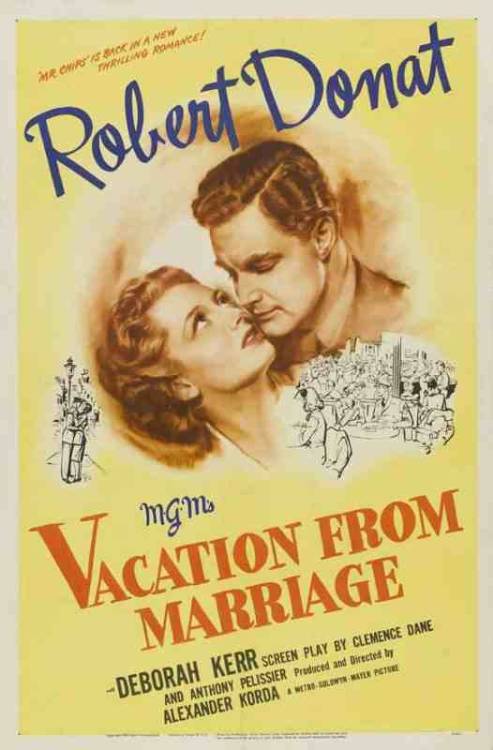

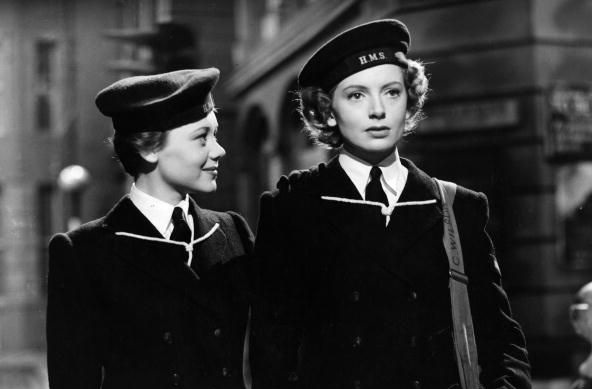

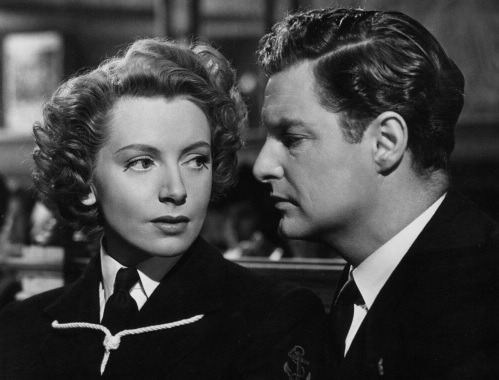
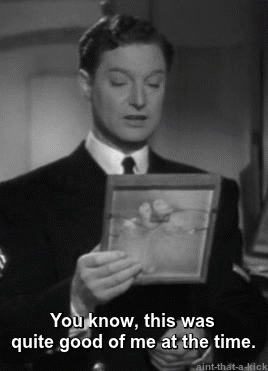
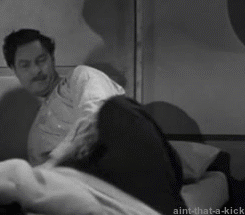
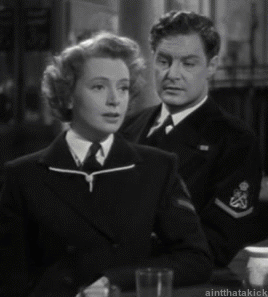

2 comments:
Hi Le.
Fantastic review. I love films that show characters being changed in some way and having to deal with that change. This is a film that I want so desperately to see, but unfortunately I haven't had any luck in finding a DVD yet. I love Deborah and Robert Donat, and I can't wait to see what they are like acting together.
Thanks for joining me to celebrate Deborah Kerr.
My first viewing of this film was on television during my teen years. As an adult I have written about it twice on my blog (I wouldn't say I'm obsessive, but geesh!).
I was looking forward to your review as I knew you would write about it with your both your heart and your mind, and this is a marvellous article.
Post a Comment